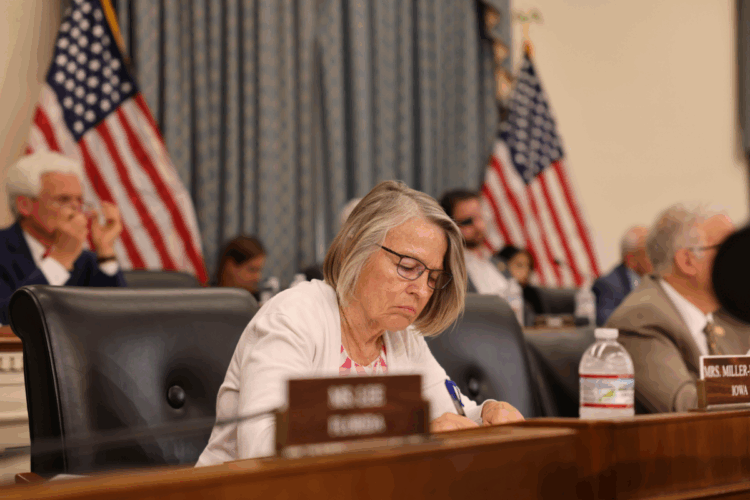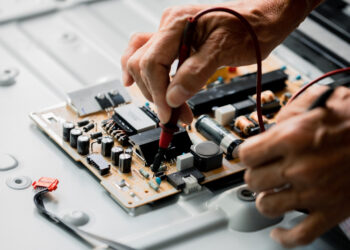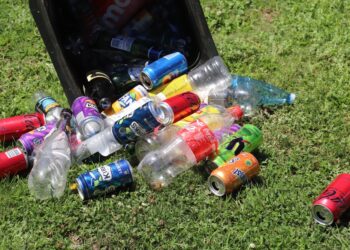During a Congressional hearing last week, lawmakers expressed enthusiasm for bolstering the U.S. electronics recycling industry as one tool in strengthening the nation’s critical minerals supply lines.
The hearing, titled “Beyond the Blue Bin: Forging a Federal Landscape for Recycling Innovation and Economic Growth,” was held July 16 before the Environment Subcommittee of the House Energy & Commerce Committee. It addressed several segments of the U.S. recycling industry, including electronics processing.
Rep. Gary Palmer, a Republican of Alabama and chairman of the subcommittee, opened the hearing by referencing President Trump’s executive actions calling for securing the country’s critical mineral and rare earth supply chains.
“We must use an ‘all of the above’ approach when it comes to ensuring our ability to access these critical minerals and elements, which is why electronic waste, e-waste, is so important for our future,” Palmer said. “With the growth of data centers and use of technology, e-waste is accumulating at higher rates every year with billions of dollars in losses as this technology reaches its end life. E-waste is a commodity that can be repurposed in our fight to not only be energy independent, but energy dominant.
“Let me be clear, we will not recycle our way out of these issues,” Palmer added. “However, as we look to build out our mining capacities, our processing and refining capacities, e-waste recycling innovation provides vital short- and long-term support for our needs as a nation.”
Emerging smelter-alternative in the spotlight
Rep. Brett Guthrie, a Republican of Kentucky, said in the hearing that the U.S. is “seeing incredible growth in data centers needed to support artificial intelligence infrastructure.”
“But will our waste and recycling laws allow us to manage an expected uptick in electronic waste?” he asked. “And how we can recover valuable materials such as critical minerals from items that are discarded every day?”
Matt Bedingfield, executive vice president of commercial strategy and growth at circuit board refiner Mint Innovation and an expert witness during the hearing, described some of the downstream refining methods available today.
“The conventional solution is pyrometallurgical refining,” Bedingfield told lawmakers. He described these smelters as capital-intensive to construct and requiring several years to build, as well as putting out emissions. There is a dearth of circuit board smelters in the U.S., although Aurubis’s new smelter in Georgia is adding capacity to process boards.
Mint, which is currently developing its first U.S. site in Texas, uses a hydrometallurgical process to recover key metals from e-scrap. Bedingfield noted the company’s facilities cost $30 million and take about a year to build out. The company’s in-progress facility in Longview, Texas, will consume “up to 8,000 tons of printed circuit boards per year, and will recover these metal units to be used domestically in the U.S. supply chain.”
Bedingfield noted the company chose Texas in part because about 15% of U.S. ITAD companies are located in Texas, and that the state is located near a large concentration of data centers. That plant has been sited, Mint is taking possession of the property, and the company has ordered equipment.
“We’re currently out in the market raising capital to ensure that we can build that one and the next one to two after that,” Bedingfield said. He anticipates the facility will be up and running in the first quarter of 2026, with the plant fully operational by the end of that year or early 2027.
Bedingfield also offered support for federal funding to support public education about how and why to recycle electronics, and directing funds to states that can then incentivize local investment in recycling projects to recover critical minerals. He made the case that these investments are more effective than grants to specific company projects.
“As we think about critical minerals security, the United States cannot and should not rely on massive government grants for single projects,” Bedingfield added. “Those can become single points of failure depending on company performance, operations and poor market conditions.”
Federal legislation receives e-scrap industry support
Shortly after the hearing, a bipartisan team of lawmakers introduced the Cultivating Investment in Recycling and Circular Local Economies (CIRCLE) Act. Sponsored by Reps. Brian Fitzpatrick, Republican of Pennsylvania, and Tom Suozzi, Democrat of New York, the legislation would use tax credits to incentivize recycling infrastructure investments, representing a different tack than the grant funding approach the Department of Energy employed under the Biden administration.
The bill creates a “30% investment tax credit — phased out over 10 years — for qualified investments in new or upgraded recycling infrastructure,” the sponsors said in a release. “Municipalities investing directly in waste reduction efforts will receive a direct rebate, ensuring local governments can modernize without passing the burden on to taxpayers.”
Nationwide electronics processor ERI praised the CIRCLE Act in a statement.
“Looking to the future, the only sustainable form of economy is a circular economy, where products are responsibly recycled,” said John Shegerian, chairman and CEO of ERI. “We support and endorse the bipartisan, future-forward, job-creating CIRCLE Act as a productive way to invest in our country. Investing in and incentivizing organizations who are engaging in or empowering circular practices makes perfect sense and we strongly encourage passage of the Act.”





























